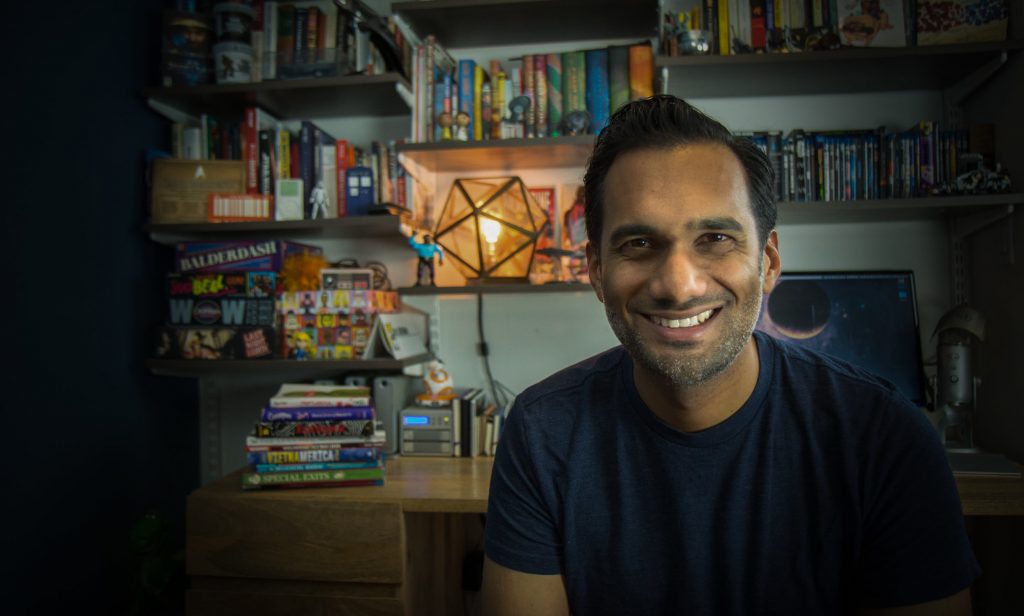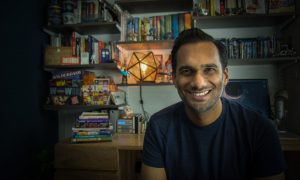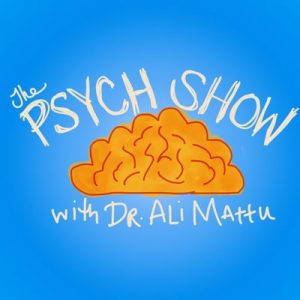Meet Dr. Ali Mattu, Clinical and Science Fiction Psychologist [Interview]

Dr. Ali Mattu is a clinical psychologist who specializes in the treatment of anxiety and body-focused repetitive behaviors. Through hosting THE PSYCH SHOW on Youtube, blogging about the psychology of science fiction at Brain Knows Better, public presentations, and advocacy, Dr. Mattu aims to make psychology interesting, engaging, helpful, and accessible for everyone.
He is currently an assistant professor at Columbia University Medical Center. Previously, Dr. Mattu attended University of California, Los Angeles and received his B.A. in psychology with a minor in Asian American studies. He attained his Ph.D. in clinical psychology from The Catholic University of America in Washington, D.C.
We at Psych2Go we fortunate enough to be able to interview Dr. Mattu to learn more about himself, his work, and the connection between science fiction and psychology. Therefore, we are excited to share with you all what we’ve learned!
You’re a clinical psychologist, but your blog and Youtube focus on the psychology of science fiction! How did you become interested in sci-fi? What’s the psychological aspect that drew you to it?
 When I was a little kid, my brother took me to see Star Trek VI: The Undiscovered Country. While the movie’s social commentary on the end of the Cold War went way over my head (I was much more fascinated by the exploding spaceships), something about this universe spoke to me, the idea that humans could improve as a species and unite in the peaceful exploration of the stars.
When I was a little kid, my brother took me to see Star Trek VI: The Undiscovered Country. While the movie’s social commentary on the end of the Cold War went way over my head (I was much more fascinated by the exploding spaceships), something about this universe spoke to me, the idea that humans could improve as a species and unite in the peaceful exploration of the stars.
My love of Star Trek grew into a love of science fiction. From Planet of the Apes to 2001: A Space Odyssey, Alien and Blade Runner, to Jurassic Park and The Matrix, I became consumed with questions raised by science fiction. Who are we? What separates us from animals and machines? What would happen if we could create life? How will we react if we meet aliens?
Frederik Pohl said, “A good science fiction story should be able to predict not the automobile but the traffic jam.” I loved thinking about these traffic jams, the issues that kept humans from becoming that optimistic future of Star Trek.
When I got to community college, I realized psychology is a science focused on the issues raised by science fiction. I discovered that my love of science fiction was really a curiosity about human nature. That’s when I decided to become a psychologist.
Could you define what it means to be a “science fiction psychologist” for our readers?
I want to help science fiction geeks fall in love with the brain and behavioral sciences. As a science fiction psychologist, I take big ideas from popular stories (like Star Wars, Black Mirror, The Walking Dead) and use those ideas as a bridge to help people understand psychology. The Force becomes a metaphor for mindfulness, lack of eye contact explains inhumane behavior in Black Mirror, and living in a zombie apocalypse demonstrates the chronic impact of traumatic stress. Hopefully, people reading my work are left with a better understanding of the stories they love and of psychology.
 While reading through your work, I was surprised at how steeped a lot of pop culture is in bigger issues; namely, your article on Battlestar Galactica and suicide prevention. Is it common to find hard-hitting psychological themes in media?
While reading through your work, I was surprised at how steeped a lot of pop culture is in bigger issues; namely, your article on Battlestar Galactica and suicide prevention. Is it common to find hard-hitting psychological themes in media?
It’s easy to find psychological themes in media! I often see stories explore emotions, relationships, and nature versus nurture. I keep a running list of books, TV shows, and movies that I want to explore on my blog or YouTube channel. The list is always expanding and I never have enough time to tackle even a fraction of what’s on it.
More and more people are identifying as “nerds” and “geeks”, and finding a lot of power in embracing their love of knowledge, science fiction, fantasy, etc. Do you have any theories on why there’s so much power in these terms?
I love what Simon Pegg has to say about this:
“Being a geek is all about being honest about what you enjoy and not being afraid to demonstrate that affection. It means never having to play it cool about how much you like something. It’s basically a license to proudly emote on a somewhat childish level rather than behave like a supposed adult. Being a geek is extremely liberating.”
A few things have happened that have empowered more people to identify as geeks and nerds. First, while the internet gets blamed (rightfully so) for creating a lot of division, it has also brought a lot of people together around shared interests. I remember thinking my geeky interests were strange and the first friends I made who loved Star Trek as much as I did were on the internet. Second, comic con culture as well as superhero films have become mainstream. Nowadays it’s cool to go to a convention or wear a superhero t-shirt to school (wasn’t so when I was young). Lastly, the image of what a geek or nerd is has changed. We’ve gone from stereotypes like those in Revenge of the Nerds to scientific icons like Neil deGrasse Tyson and actress turned producer Felicia Day.
Much like the history of the word queer in the United States, nerd and geek has transformed from an insult (or at worst slur) to an empowered identity.
Your Youtube channel is exciting, fascinating, and really informative. Why did you decide that Youtube was the best way to “bring psychology to everyone” (as per your bio description)?
Discovering psychology was one of the most transformative moments in my life. But I wonder what would have happened to me if I had discovered it sooner? I was a bad student because I didn’t know how to learn. Cognitive psychology would have corrected that. I had selective mutism in which transformed into social anxiety. Learning about clinical psychology might have made it easier to get help. If I understood social psychology I might have done something when I saw my friends get bullied (instead of doing nothing).
While I still love my science fiction psychology blog, it appeals to a relatively small group of people – those who love science fiction and are open to learning more about psychology. I wanted to create something bigger, something that could bring psychology to everyone, everywhere. That’s why I launched The Psych Show on YouTube.
YouTube gave me the opportunity to create a channel that supported the variety of content I wanted to make. I could make tutorials about practicing self-care, share personal stories like what I’ve learned from becoming a parent, contribute to pop culture discussions about Star Wars: The Last Jedi, and debate current events topics like why diversity in media matters. On The Psych Show, psychology could become part of larger global conversations.
Three years into my channel, this is exactly what’s happened. The Psych Show’s audience is far more diverse in regards to geography, gender, and age than my blog. My videos have been watched, shared, and commented on more than anything I’ve written. It’s been wonderful to connect with, and learn from, the community that’s formed around The Psych Show.
How can we millennials, in our day-to-day media consumption, pay more attention to the psychological themes? How can we think critically about shows and movies while still enjoying them and using them as a means to escape?
Whenever I’m talking to someone about a story they love, I always ask, “How did this story impact you?” That’s a great way to understand the meaning a story has for you. Maybe it helped you get through a tough time, perhaps it was something that helped you bond with a loved one, or maybe it spoke to a personal experience you have gone through. These are all important ways in which media can have a psychological impact on us.
When I’m consuming media, I also try to understand what it is saying about the brain, thoughts, emotions, and behavior. With shows like Mindhunterthere are obvious parallels to psychology. Sometimes, as in the case of This is Us, you have to look a little closer. But the things that make for a great story (emotion, drama, conflict) will always make for interesting psychology.
One more thing to remember – it’s okay to love something and to criticize it. I love Star Trek: The Original Series but most of its representation of women is sexist. There are a lot of shows I’m a big fan of that completely mess up psychology. That’s okay – I’m happy to discuss those issues and still suspend my disbelief enough to enjoy watching it.

A big thanks to Dr. Mattu for taking our questions! It’s really great to hear from someone who is so passionate about two seemingly different topics and how Dr. Mattu has been able to connect them together to work on projects that he enjoys. It is fantastic to see how Dr. Mattu is making psychology accessible to a wider variety of people, by applying concepts to pop culture references that many people can understand, not just those with an educational background in psychology. He also brings up a great point about being critical about things we love. While we can enjoy a wide variety of media, it is also important to be mindful of its inner workings, meanings, and implications to make us more educated individuals.
To check out Dr. Mattu’s work, be sure to check out his videos at THE PSYCH SHOW!
You can read more about his insights on how science fiction and psychology connect through his articles on Brain Knows Better!
If you’d like to learn more about Dr. Mattu, visit his website: http://alimattu.com/




Responses